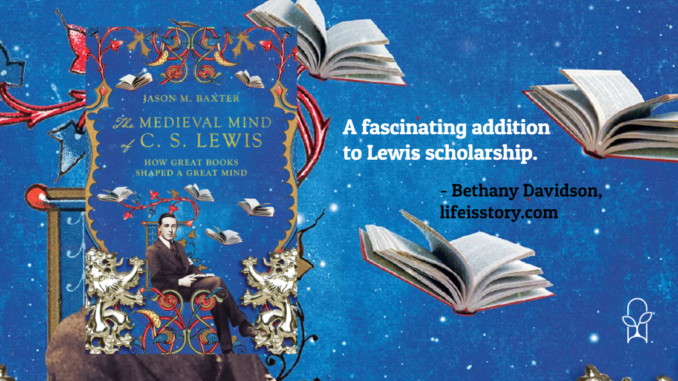
Published by IVP Academic on March 8, 2022
Genres: Academic, Non-Fiction, Christian Life, Theology
Buy on Amazon
Goodreads

C. S. Lewis had one of the great minds of the twentieth century. Many readers know him as an author of fiction and fantasy literature, including the Chronicles of Narnia and the Space Trilogy. Others know him for his books in apologetics, including Mere Christianity and The Problem of Pain. But few know him for his scholarly work as a professor of medieval and Renaissance literature.
What shaped the mind of this great thinker? Jason Baxter argues that Lewis was deeply formed not only by the words of Scripture and his love of ancient mythology, but also by medieval literature. For this undeniably modern Christian, authors like Dante and Boethius provided a worldview that was relevant to the challenges of the contemporary world. Here, readers will encounter an unknown figure to guide them in their own journey: C. S. Lewis the medievalist.
As soon as I learned about this book, I knew that I wanted to review it. C.S. Lewis has been my favorite author ever since I was nine, and I have read so many of his works and so many biographies about him that I feel like I know him, from the overarching narrative of his life to the quotidian and trivial details of his experiences. However, as Jason M. Baxter states in the introduction of this book, C.S. Lewis’s medieval influences and work as a medieval scholar are far less understood or appreciated. Throughout this book, Baxter explores the influence that different medieval texts had on Lewis’s theology, life, and writings, showing how Lewis walked out of step with his rationalistic, materialist, industrial society because he had drunk so deeply from a well of old books.
The Medieval Mind of C. S. Lewis: How Great Books Shaped a Great Mind is a fascinating addition to Lewis scholarship. The book is about 150 pages long and doesn’t require a huge time commitment, but I moved through it slowly due to my shaky, secondhand knowledge of medieval literature. I enjoyed learning in more detail about the cosmology, writings, and spiritual perspective of the era, and appreciated how well Baxter tied in key points with examples from the Narnia series and Lewis’s essays. The chapter about Dante’s influence on Lewis was especially interesting to me, and has inspired me to finally read The Inferno.
I have already recommended this book to my fellow C.S. Lewis nerd at church, and people who have an academic interest in the medieval era and in Lewis’s writings will find this book worth the mental investment. The Medieval Mind of C. S. Lewis is also an excellent resource for fiction writers who are interested in entwining philosophical themes in their works, since this book clearly demonstrates how Lewis engaged with deep themes in his fiction for children and adults, as well as in his nonfiction writing. This book would also be a great source for class readings in some history and literature courses.
